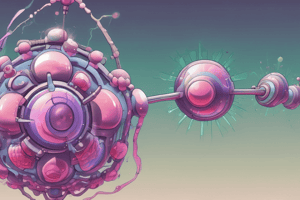Podcast
Questions and Answers
What is the most common long-term side effect of using glucocorticoids?
What is the most common long-term side effect of using glucocorticoids?
- Cushing-like syndrome
- Osteoporosis (correct)
- Gastritis
- Hyperglycemia
What is the main function of aldosterone in the kidneys?
What is the main function of aldosterone in the kidneys?
- To decrease sodium levels
- To decrease bicarbonate levels
- To increase potassium levels
- To increase water and electrolytes (correct)
What is the effect of spironolactone on the body?
What is the effect of spironolactone on the body?
- It increases sodium reabsorption
- It stimulates aldosterone synthesis
- It decreases potassium reabsorption
- It competes for the mineralocorticoid receptor and inhibits sodium reabsorption (correct)
What is the use of fludrocortisone?
What is the use of fludrocortisone?
What is the effect of ketoconazole on the body?
What is the effect of ketoconazole on the body?
What is the benefit of using eplerenone over spironolactone?
What is the benefit of using eplerenone over spironolactone?
What is the primary use of glucocorticoids in asthma and COPD?
What is the primary use of glucocorticoids in asthma and COPD?
Which of the following glucocorticoids is used to hasten fetal lung maturation in preterm infant delivery?
Which of the following glucocorticoids is used to hasten fetal lung maturation in preterm infant delivery?
What is the primary mechanism of the dexamethasone suppression test in diagnosing Cushing syndrome?
What is the primary mechanism of the dexamethasone suppression test in diagnosing Cushing syndrome?
What is the primary complication of glucocorticoid deficiency in congenital adrenal hyperplasia?
What is the primary complication of glucocorticoid deficiency in congenital adrenal hyperplasia?
What is the primary function of the steroid-receptor complex in the nucleus?
What is the primary function of the steroid-receptor complex in the nucleus?
Which of the following glucocorticoids has the longest half-life?
Which of the following glucocorticoids has the longest half-life?
What is the primary use of glucocorticoids in inflammatory skin disorders?
What is the primary use of glucocorticoids in inflammatory skin disorders?
What is the effect of glucocorticoids on muscle protein?
What is the effect of glucocorticoids on muscle protein?
What is the primary mechanism of glucocorticoids' anti-inflammatory effect?
What is the primary mechanism of glucocorticoids' anti-inflammatory effect?
What is the effect of glucocorticoids on lymphoid tissue?
What is the effect of glucocorticoids on lymphoid tissue?
What is the role of coactivator or corepressor proteins in the mechanism of glucocorticoid action?
What is the role of coactivator or corepressor proteins in the mechanism of glucocorticoid action?
What is the effect of glucocorticoids on bone metabolism?
What is the effect of glucocorticoids on bone metabolism?
What is the primary naturally occurring glucocorticosteroid?
What is the primary naturally occurring glucocorticosteroid?
What is the effect of glucocorticoids on cell-mediated immunologic functions?
What is the effect of glucocorticoids on cell-mediated immunologic functions?
Flashcards are hidden until you start studying
Study Notes
Mechanism of Action of Glucocorticoids
- Bind to steroid receptors in the cytosol, forming a steroid-receptor complex
- The complex translocates to the nucleus, recruiting coactivators or corepressors, and binds to hormone response elements or gene promoter elements (GRE or MSE)
- Acts as a transcription factor to turn genes on or off, depending on the tissue and complexed proteins
Effects of Glucocorticoids
- Metabolic: promote gluconeogenesis, proteolysis, lipolysis, and lipogenesis, leading to net fat deposition
- Catabolic: muscle protein breakdown, lymphoid, connective tissue wasting, fat and skin, and osteoporosis
- Immunosuppressive: decrease cell-mediated immunologic functions, especially lymphocytes
- Anti-inflammatory: inhibit phospholipase A2, increase neutrophils, and decrease chemotaxis, basophils, monocytes, eosinophils, and lymphocytes
Glucocorticosteroids
- Cortisol (hydrocortisone): the major naturally occurring glucocorticosteroid
- Synthetic glucocorticosteroids: prednisone, triamcinolone, dexamethasone (longest half-life), betamethasone (topical), beclomethasone, and budesonide (short half-lives)
Uses of Glucocorticosteroids
- Asthma and COPD: inflammatory lung diseases
- Addison disease: primary glucocorticoid insufficiency
- Diagnosis of Cushing syndrome: dexamethasone suppression test
- Congenital adrenal hyperplasia: deficiency of cortisol and aldosterone synthesis
- Inflammatory skin disorders, allergic reactions, and urticaria
- Rheumatological and autoimmune disorders, such as TMJ and RA
- Blood cancers, such as lymphatic leukemia
- Preterm infant delivery: hasten lung maturation prior to delivery
Side Effects of Glucocorticosteroids
- Dose-related: primary dose-related side effects
- Osteoporosis: most common long-term side effect
- Gastritis: most common short-term side effect
- Cushing-like syndrome
- Hyperglycemia
- Cataracts
- Skin atrophy, ecchymosis, and purple striae with long-term topical use
- Immunosuppression: increased infection
- Inhaled: oral candidiasis, hoarseness, and throat irritation
- CNS: mood changes, including swings, euphoria, and depression
Mineralocorticosteroids
- Aldosterone: the major naturally occurring mineralocorticosteroid in humans
- Synthetic mineralocorticosteroids: fludrocortisone (has significant glucocorticoid activity)
- Corticosteroid antagonists: spironolactone and eplerenone
- Antagonize mineralocorticoid receptors, inhibiting sodium reabsorption and increasing potassium reabsorption
Corticosteroid Antagonists
- Spironolactone: antagonizes mineralocorticoid receptors, competes for the receptor, and inhibits sodium reabsorption and increases potassium reabsorption
- Eplerenone: selective aldosterone antagonist with less affinity for androgen receptor
- Uses: resistant hypertension, heart failure, hyperaldosteronism, and hirsutism in women
- Adverse effects: hyperkalemia, gynecomastia, menstrual irregularities, and skin rashes
Studying That Suits You
Use AI to generate personalized quizzes and flashcards to suit your learning preferences.




